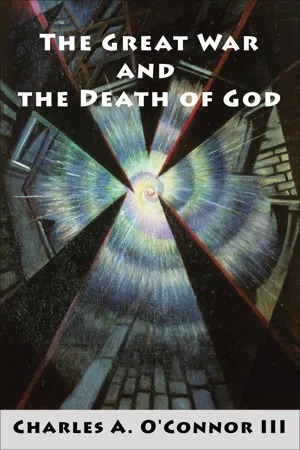
- 348 pages
- English
- ePUB (mobile friendly)
- Available on iOS & Android
The Great War and the Death of God
About This Book
A compelling analysis of how World War I spurred the rise of atheism and the subsequent effect on Western theology, philosophy, literature, and art. The catastrophic Great War left humanity in a world no longer trustworthy and reassuring but seemingly meaningless and indifferent. Instead of redressing humanity's cosmic alienation, postwar Western culture abandoned its concern for cosmic meaning, lost its confidence in human reason, and enabled the scientific worldview of neo-Darwinian materialism to emerge and eventually dominate the Western mind. According to the proponents of that worldview, science is the only source of genuine truth, nature is the product of a blind evolutionary process, and reality at bottom is just physics and chemistry. Thus, God is dead and continued belief in a transcendently purposeful universe is intellectually indefensible and either disingenuous or delusional. By turning away from the eternal questions about the nature of reality, Western culture effectively ceded unwarranted credibility and prominence to neo-Darwinian materialism, including its recently strident New Atheism. "O'Connor revisits the 20th century's journey from Nietzsche's declaration of the 'death of God' to the rise of materialism as the dominant worldview of western intelligentsia. We live in a world that has largely expelled both mind and meaning from the citadels of serious intellectual pursuit, and O'Connor's book is a fascinating and scholarly expedition into the 'how' and 'why' of that troubling development." —Carter Phipps, author of Evolutionaries "I found this topic to be top-rate. The book is well researched and conceived, nicely narrated and analyzed, and an original body of inquiry into a challenging, fascinating intellectual tradition." —Ronald M. Johnson, Professor Emeritus of American History, Georgetown University
Frequently asked questions
Information
Table of contents
- Cover
- Title
- Copyright
- Dedication
- Contents
- Preface
- Acknowledgments
- Chapter 1. Introduction
- Chapter 2. God, Science, and Reason in Prewar Western Culture
- Chapter 3. The Great War and Cultural Breakdown
- Chapter 4. Postwar Christian Theology
- Chapter 5. Postwar Western Philosophy
- Chapter 6. Postwar Western Literature
- Chapter 7. Postwar Western Art
- Chapter 8. Materialism from World War I to the Present
- Chapter 9. Conclusion
- Notes
- Bibliography